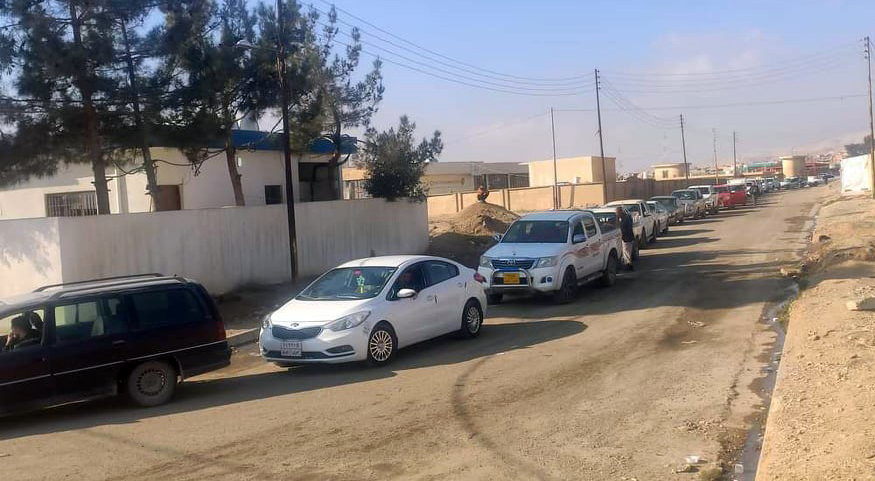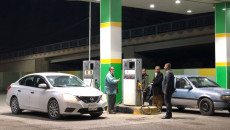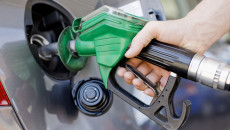Whenever his car runs out of petrol, Hussein Saeed knows it's time for him to spend hours queuing in front of filling stations in Sinjar, hoping to pick up 40 liters of petrol.
Saeed's problem is the same as that experienced by all motorists in Shingal district due to the shortage of gasoline at state-subsidized public petrol stations that popped up a month ago.
"We are waiting in a long queue for several hours in order to receive our portion of gasoline. What makes matters worse is that gasoline is distributed at government stations from 7:30 in the morning until 11:30 am," Saeed angrily said.
According to KirkukNow follow-up, some residents are unable to stand in petrol queues due to daily preoccupations and work hours, so they put their vehicles in line at night in the hope that they will receive their share of petrol the next morning. Some of them sleep the night inside their vehicle.
The dire situation in the petrol queues forced Saeed to go to Tal Afar, 40 minutes driving by car from Shingal district of Nienwa province. "I received petrol at a government filling station there without having to stand in line because the filling stations are open there even after official working hours."
In the last week, I was obliged to refuel at the private petrol stations
There are only two public stations in Shingal, beside 20 private fuel stations.
"As far as we know, Shingal's quota of gasoline has been cut to half under the pretext that the displaced have not returned, and there are two stations for the district center and the three sub-districts of Shingal," said Saeed.
In August 2014, the Ezidi (Yazidi) community who make up the majority of the population of Shingal (west of Mosul) were subjected to campaigns of killing, kidnapping and displacement at the hands of the extremist militants of the Islamic State in Iraq and the Levant (ISIL), and up today thousands of them have not returned to their homes due to the lack of services.
Subsidized fuel policy which is distributed via public petrol stations is practices since many years in Iraq which had a central state-run economy in all sectors up to 2003, when Saddam Hussein was ousted, per which the Iraqi government through the public sector was providing subsidized services.
In Iraqi Kurdistan region, most of petrol stations are private where gasoline costs double compared to state-run petrol stations all over Iraq excluding the Kurdish region which receives small quantities from Baghdad and the rest is imported.
The cost which is soaring up day after day due to oil prices in global markets has pushed motorists in Kurdish towns adjacent to the disputed territories to fill tanks of their vehicles, a matter pushed Iraqi officials to limit their subsidization for this sector in those areas.
Video: Vehicles queuing to receive gasoline in Shingal
Khalaf Atto, a taxi driver who returned to Shingal last year, said, "The gasoline crisis erupted a month ago. We spend hours in queues to receive our share of government gasoline. About a week ago, I was obliged to refuel my car at private stations."
"I need 20 to 30 liters of gasoline daily, because I work as a taxi driver. Purchasing gasoline at a price of 750 Iraqi dinars per liter is a great burden for me, and it is necessary to address this crisis," Atto told KirkukNow.
One liter of gasoline is sold at a subsidized price of 450 IQD (0.30 USD) per liter, but the price of one liter of gasoline at private filling stations is 750 dinars ($0.50).
Local officials confirmed that daily portion of Shingal has been dropped up to one third.
Khodida Chuki, mayor of Sinuni sub-district, said the share of Shingal has been reduced as before the emergence of this crisis, Shingal was receiving 30,000 liters of gasoline per day, but now it ranges between 11 and 15,000.
Chuki believes the portions cut in provinces of Ninewa and Kirkuk are sold by Baghdad to Kurdistan Region.
People of Sinjar are oppressed, because such matters never happen in any other part of Iraq
In the Kurdistan Region, a liter of gasoline is sold at private filling stations for 850 IQD, and sometimes these provinces are supplied with government gasoline, which is sold there at a price of 690 IQD.
Chuki explained that another reason behind the congestion at petrol stations is the inability of two stations to meet the needs of vehicle drivers, as 90,000 people live in the center of Shingal district, while more than 140,000 people live in Sinuni sub-district. Khodida pointed out that one of the two government stations is located in the center of Shingal and the other is at the center of Sinuni.
"The people of Sinjar are oppressed. This never happens in any other region of Iraq. The share of the other neighboring regions has not been reduced at all under the pretext of the small number of residents, as is the case against us, although we complained to Ninewa officials, but our efforts did not yield anything," said mayor of Sinuni.
Across Nineveh province, there are 28 public petrol stations, 11 of which are located in the city of Mosul. These stations distribute more than 2.4 million liters of gasoline per day.
Iraq holds the second-largest oil reserves following Saudi Arabia but years of conflict and sanctions have left its refineries in dire straits, with the country now relying heavily on imports of oil products despite daily export of over three million barrels of crude oil a day.







